Aug 17, 2024
Sailesh
Ramakrishnan
Sailesh Ramakrishnan, co-founder and managing partner of Rocketship.vc, a Silicon Valley venture capital fund founded in 2014, has a rich background in computer science and experience with AI projects at NASA. His career includes roles at Kosmix, an AI company acquired by Walmart, and the co-founding of a marketing platform for small businesses later bought by Square. Rocketship specializes in early-stage global investments, utilizing AI and machine learning to identify promising startups while focusing on supporting new ventures and mentoring entrepreneurs.
One Line Life Lessons from Sailesh
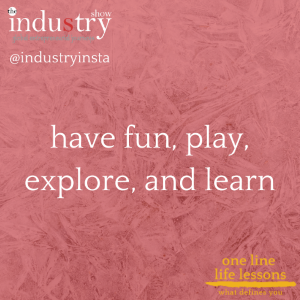
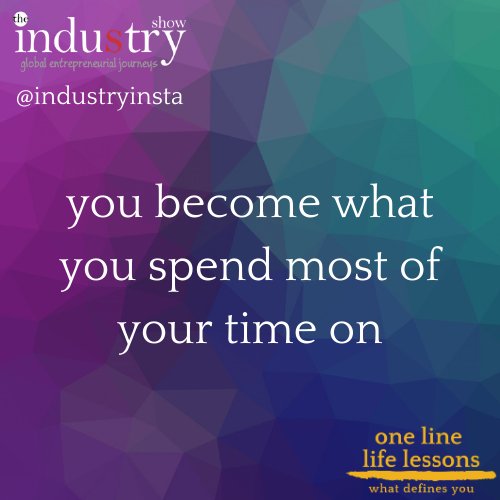
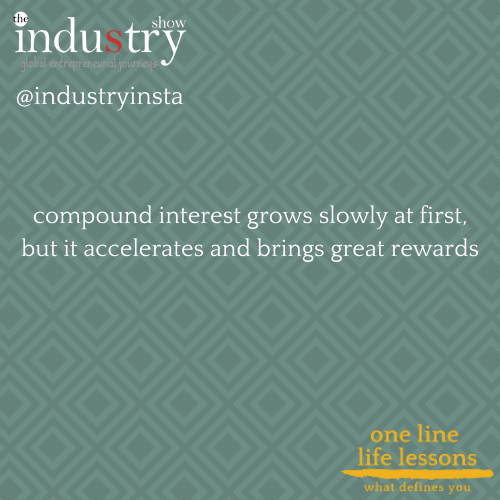
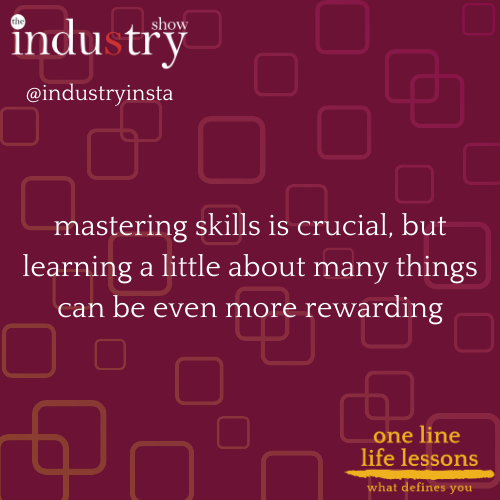
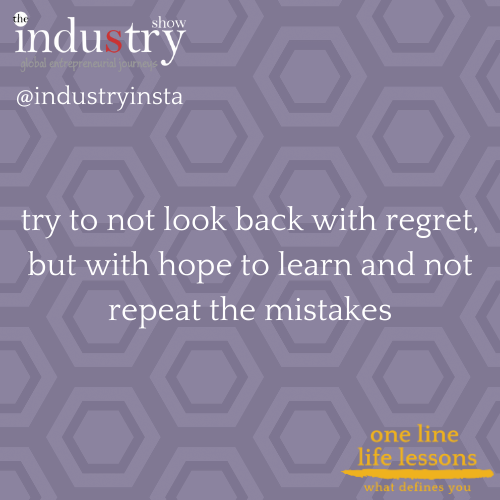
Episode Highlights
0:00 – Introduction to Sailesh Ramakrishnan
- Overview of his background in computer science and experience with AI at NASA.
- Discussion of his roles at Kosmic and the marketing platform acquired by Square.
2:15 – Rocketship Ventures Overview
- Introduction to Rocketship, its founding in 2014, and focus on early-stage global investments.
- Explanation of how AI and machine learning are utilized to identify promising startups.
4:45 – Shifts in Space Technology and Food Production
- Commentary on how small startups are taking on ambitious space projects.
- Comparison to historical reliance on nation-states for such endeavors.
7:30 – Current Wave of AI Development
- Insights on the significant funding fueling the latest advancements in AI.
- Discussion on the cyclical nature of skepticism and hype in technology.
10:00 – Personal Reflections on Career Choices
- Sailesh shares pivotal life decisions, such as choosing IIT Madras over BITS Pilani and leaving a PhD program.
- Reflection on satisfaction with his career trajectory over 35 years in AI.
13:20 – Evolving Perspective on Fun
- Discussion of how his view on fun has shifted from outdoor sports to simpler pleasures.
- Emphasis on the joy of traveling and experiencing new things.
15:45 – Recommended Readings
- Suggests “Atomic Habits” for its focus on incremental improvements.
- Mentions Ben Horowitz’s book on decision-making and its alignment with teachings from the Gita.
18:30 – Life Lessons for Different Stages
- Advice for youth to prioritize fun and exploration.
- Guidance for young adults on wise time management.
- Encouragement for early starts in skill mastery and broad knowledge to prevent future regrets.
21:00 – Conclusion
- Summary of key takeaways and a final motivational note for entrepreneurs and innovators.
Show Transcript
Transcript - Full Episode
[00:00:00 – 00:00:09] Nitin Bajaj
Everyone. Welcome to the industry show. I’m your host, Nitin Bajaj. And joining me today is Sailesh Ramakrishnan. Sailesh, welcome on the show.
[00:00:09 – 00:00:11] Sailesh Ramakrishnan
Hey, Nitin. Thank you so much for having me.
[00:00:12 – 00:00:18] Nitin Bajaj
Thanks for being here, and it’s a pleasure. Let’s start with who is Sailesh.
[00:00:18 – 00:02:54] Sailesh Ramakrishnan
I am currently the managing partner of, Fund Called Rocketship, here in Silicon Valley. We are based here in, Los Altos. We are about 10 years old. We started the fund back in 2014. And I’m one of the managing partners and, the one of the founders. I I named the fund Rocketship because I’ve been, passionate about things that go to space for a long time. About one whole career ago, I was a computer scientist working at NASA where I worked on AI for the Mars rover project back in the 2000. And it was a tremendously fun experience. But then I found something that is even more passionate about, and that happened to be just outside the door from NASA, which is the rest of Silicon Valley, which is all about startups. Bajaj in 2005, I joined a very exciting start. It was an AI company that was going to take on Google at that time. And so many of our ideas that we came up Nitin that company were copied by Google in some sense. We see we we believe we were a little bit ahead of the time, which is good to see. In in 2011, that company, Kosmic, was acquired by Walmart. So we went to work with the world’s largest retailer where we created this new division within Walmart called Walmart Labs. And that was a tremendously exciting experience to work on things that are at that larger scale. It was but I had, as I said, been bitten a little bit by the start. And so I wanted to be a founder as well. Decided to leave Walmart to join another colleague, and we started a company where we created a marketing platform for small and medium sized businesses. And, in 2014, we were acquired by Square, the the cash register company. So that’s been my journey from being a computer scientist to being a startup guy and an entrepreneur to now, starting a VC fund. And Rocketship in one sentence is a global, investor, early stage in startups where we actually use AI and machine learning to find the best companies to invest in. So our algorithms tell us on a daily basis which companies we should go out and seek, and we do talk to them all over the world and make investments. So as of today, we have investments in 14 different countries and over 20 different sectors. So that in a nutshell is the story, at least from a work career perspective, of of who I am. Couple of just personal points of note. I am from India as we would have obviously already guessed. I went to IIT Madras back in India, and I am from Madras. I was born and brought up. So very much from the south as well. So that’s a little bit about personal stuff.
[00:02:55 – 00:03:14] Nitin Bajaj
Such a fascinating such an amazing journey. And not that that defines someone, but the brands, the logos that you’ve been able to not just work with, but define the future for them. Such a such a fascinating career. So congratulations on that.
[00:03:15 – 00:03:16] Sailesh Ramakrishnan
Thank you.
[00:03:16 – 00:03:31] Nitin Bajaj
Me to my next question. You could have done anything. You’re a scientist. You are a nerd in a good way. You live in Silicon Valley. You are from the prestigious IITs. Why Rocketship?
[00:03:32 – 00:05:04] Sailesh Ramakrishnan
So actually, it was an interesting combination of things. Like I said, the thing that I got most excited by was this ability of going from 0 to 1, which is the thing that defines a startup. Right? So I knew I always liked starting things. And one way of starting something new is to start this fun, but also be constantly be, a part of other people’s 0 to 1 journeys as well. And so that’s how my perspective to rocketship k b o one is that I wanted to constantly be both building something, which is our algorithms to find these companies, but at the same time also be talking to other entrepreneurs who are going through that same 0 to 1, journey and partly live their experiences, as well. And it also gives both them and us a lot of joy in the sense that we have done this before ourselves. And doing this again and again, while it has its, significant challenges as everybody knows, is also personally very rewarding to to see that when nothing existed, now something has been created, something that adds in delivers value. So that’s how we ended up starting RocketShip. The third part of it, which maybe is not as emphasized, but it’s also the thing of trying to do something brand new. We felt that it hadn’t been done before. And as a scientist, that’s almost one of the first things you look for. Right? Like, why hasn’t this been done? And in fact, when we started this and talked to people about what we were planning to do, almost everybody said, but why hasn’t this been done before? And we felt happy that we were breaking new ground, if you will.
[00:05:04 – 00:05:36] Nitin Bajaj
And something that is in your DNA, I would imagine, as a scientist. So great to see many different parts and aspects of you come together in a way. And and you stole my word as a as you were saying that I was thinking about, oh, you get to live vicariously through so many different people that are creating and building new things, bringing innovation to life. You get to be a part of it, but it’s having your neighbor who has children and you get all the benefits but not any of the pain.
[00:05:37 – 00:06:13] Sailesh Ramakrishnan
I wish it was the case that we don’t have any other pain. But but as good investors as well as mentors to many of our startups, we do share their pain as well. The difference though, I think with the point you’re making is very valid. The difference though that we don’t have to live it every day. As an entrepreneur, as a founder, which I was, you live your stuff. Whereas I live many different startup journeys on different days and different times. So it is a much lesser burden. I would know where I compare it to the day to day, you know, challenges that most founders face. But at the same time, we do share both in the highs and the lows.
[00:06:13 – 00:06:49] Nitin Bajaj
True. And also the experiences and the learnings that you collectively gather across the portfolio that you’re able to bring to them to improve their chances of success, their probabilities. And that’s what the startup journey is all about. That’s why someone would look to partner with someone like Rocketship that has that credibility, that has that track record. So very valid points. So, Sailesh, as you’ve gone through this journey, as you have looked at many levels of success, what I’m curious to know is what is the one big challenge you’re facing right now?
[00:06:51 – 00:09:00] Sailesh Ramakrishnan
Oh, that’s almost the standard answer you’re gonna hear a VC give you is that the world from our perspective is changing so rapidly. And it is very hard for us to to keep up with so many things that are happening. Right? Almost every VC, if they’re worth their salt, are operating on the cutting edge. And we, thanks to our algorithmic, perspective, literally, truly on the cutting edge and have the opportunity to see what’s going on. So it’s very hard to keep up. So many things are happening. Things in every sector. Even things that people haven’t been paying too much attention to are completely being revolutionized. An example a simple example, I’m vegetarian. I’m vegan. Mhmm. And most people have already dismissed this whole artificial protein movement as all Beyond Meat and Impossible Burger. They’ve done this thing, and that’s all over now. But that’s actually, you know, the least of it. There’s so much innovation now happening in the last 5 years that you’re gonna see a revolution in in how food is made, how food is consumed, how, food is going to, taste and be cooked. And I wouldn’t have known anything about this if I was just a regular person because my perspective would have been exactly the same thing as a grocery store. Right? You go see these things, and if they’re not there anymore, then you’re like, maybe that was a fad and that’s gone. But now techniques that come from, like, physics and chemistry, new math that is being invented to understand the elasticity of those proteins. All of these things are contributing to this tremendous journey. In just this one tiny sliver of a segment, that’s the world I live in. On any given day, the kinds and the variety of companies I’m speaking with just blows my mind about how much innovation is going on a daily basis. And all I can say is it is a enormous challenge, but it’s also a fun challenge to have. It makes me feel like sometimes it makes me feel like why I shouldn’t be doing some of those things myself. But for the most part, it makes me feel like what a time to be living in. Right? What a what an exciting time to be living in that on a daily basis. I get to see and hear, and sometimes taste some of these massive innovations that are happening. That’s so true. It is beyond a doubt. The fascinating time to be around and
[00:09:00 – 00:09:27] Nitin Bajaj
be in the midst of many of these innovations as they are coming to fruition. You almost get to define the edge, not just live at it. So that’s really exciting. Now flip side of challenges are opportunities. And amongst the many that you come across on a daily basis, what’s the one that you’re most excited about?
[00:09:28 – 00:12:12] Sailesh Ramakrishnan
It’s not one. It’s gonna be 2, but I’ve chosen those 2 very carefully. One is very closely related to my initial love, which is anything and everything that goes to space. Mhmm. And very similar to how pace of innovation got accelerated when the Internet was invented to the pace of innovation got even more exponentially grown through when mobile phones, were created. Now you’re seeing the level of innovation and hence consequently the rate of pace of change and growth being applied to things that go to space. From materials to rockets, to software, to the capabilities of these devices, it is just fantastic. It’s truly, literally science fiction is being invented right now today. And all and what’s so exciting about it in particular is that before it was thought of as things that only nation states could afford because these were large 100 of 1,000,000,000 of dollars. You can see small startups, creating things and have the ambition saying, I can build this and put this into space, you know, in a matter of, you know, a few months to a year. That capability is the biggest opportunities. And I think it’s an enormous opportunity. Of course, AI. And but it’s AI from my perspective, which is I’ve been working in AI and machine learning now for over 35 years. So it’s not just the this is this current wave of AI excitement wasn’t is not the only wave of AI excitement that I’ve had to live through. And and so I’ve seen this 4, 5 times. But the interesting thing about each of those times is that materially for those of us who are in the field or at least observing the field. Life and innovation has gotten significantly better. Every cycle we have been able to accomplish what nobody thought we could in a previous cycle. Now, of course, from for the folks from the outside, they think of us as always overselling the promise of AI. And I think that’s also gonna be unfortunately true of this cycle. And this is not the end either. But this is, perhaps a more significant leap, forward than what we have seen in the past. And that’s because of, 2 big things. 1 is the enormous amount of capital that is available to support this way. Previously, AI efforts were very much once again in the realm of universities and a few companies. Today, almost every company needs to have something to do with AI. And so I think that’s been pretty big. So the amount of capital is being enormous. The second is the technology is really caught the common person’s excitement or interest. So anybody and everybody, is already thinking about, hey, if I had this capability, what would I do? So those are the 2 biggest opportunities we see and the number of companies on a daily basis that you hear about.
[00:12:12 – 00:12:39] Nitin Bajaj
It is, again, truly an amazing time to be around. Now as we look forward, I wanna pause, reflect, and have you take us back in time and share 2 moments. 1, where things did not work out as you would expected and there was maybe failure lessons that came out of it. And another one where things exceeded your expectations and became a success beyond what you had imagined.
[00:12:39 – 00:13:03] Sailesh Ramakrishnan
I will start with the second first Because it was a point of inflection that was pretty early in my life. So I graduated from high school in 1989. And unfortunately, that year the professors at IIT were on strike. So I had written JE to get into IITs, and they would not they since they were on strike, they would not
[00:13:04 – 00:13:05] Nitin Bajaj
Recognize Nitin?
[00:13:05 – 00:15:55] Sailesh Ramakrishnan
No. They would no. Not compute the scores to actually give you a rank and hence decide. And so I was at a loss. I wasn’t sure what I would want to do. And months, weeks, months are going by. And if you don’t have an answer, all the other engineering schools get filled up. And so if you want to go do something, you have to go make a choice now. So I made a choice to go to the other prestigious university, which was BITS Pilani. So I went to BITS Pilani for a month. But then the decision came, and it was a pretty exciting place. Lots of interesting things. And I’ve been there for a month when the IIT results came out and I learned that I got into IIT Madras. So that was a choice point. So to decide, should I stay, at BIDS, or should I, go to IIT? And somehow in my gut, I felt like IIT was going to be something. And it was more a personal decision rather than, a a a well thought out reason than pluses and minus kind of decision. And I have to say, that decision, I did not I I completely underestimated the impact it has had in my life. And finally enough, not from a necessarily a direct subject matter education perspective, but it showed me a path of opportunities, which I’m very amazed to have gone through. So that, I think, was a very significant decision that I don’t think anybody can make those evaluations well reasoned and get the outcomes that happily. And this is something I’m gonna hopefully mention later, in our chat today. But several of these things have a compounding effect. They have exponential effects that are happening. The second decision which or second inflection point, which I’m a little bit unhappy about, but again, in the long term view has worked out okay is I dropped out of my PhD back in in 2,005. And that was a very answerful decision. And almost everybody told me I had made a mistake because I had actually gone through a typical PhD process where all what all was left was writing up my thesis work and defending it. I I finished all the qualifiers and everything. Somehow in my gut, it felt this was not the thing anymore. This didn’t have as much of the excitement and value that I wanted. And so I made that decision, and the rest of my life has moved on and I’ve been happy about it. But at the same time, that is a decision I wish I had, thought a little bit more about, put in a little bit more work or taken more seriously. Because I think the rest of my life could have still unfolded in a similar way, but then I would have had a PhD as well. So every now and then people pull me up and say, why don’t you go back and finish the degree? But I think I I’m too old for that now. So it was not a negative decision, but it did not turn out the way I wanted to because I had invested such a lot of time in it. And I do not walk away with that final price was, I think, a little disappointed.
[00:15:56 – 00:16:21] Nitin Bajaj
We live through and learn from experiences. And as you said, that may have instigated you to put a little more or drive some other initiatives in your life to the definition. First off, thank you for sharing that. It’s not easy to be open to vulnerabilities and places we’ve been to that we are not the most proud of. So really appreciate you sharing that. Now switching gears, what do you do for fun?
[00:16:21 – 00:17:18] Sailesh Ramakrishnan
What do I do for fun? That also has changed over the years. So before I was very much an outdoorsy person, I would hike a lot. I did triathlons. I’ve, done bike races and so on. And nowadays, what counts as fun is more like walking the dog outside. But more seriously, it’s, things like discovering your restaurants, going places, and traveling. Traveling is something that I’ve come to completely, fall in love with. Before I used to get worried and nervous about leaving your comfort zone and going to new places, but now, I literally crave the the the places I wanna go to and try things out and not face too much by the the challenges that come from that. Really want to keep doing for fun is is travel. But, aside from that, I think there’s a lot of other local fun things to do. And the Bay Area is, richness of of things from culture and music and art all the way out to, all kinds of physical sports.
[00:17:19 – 00:17:24] Nitin Bajaj
So true. Any book or podcast recommendation for our audience?
[00:17:26 – 00:18:24] Sailesh Ramakrishnan
So there’s 2 books that I still keep coming back to in my head again and again. One who’s authorized to remember the other one I have forgotten, but, at least I remember the title. And the first one is is this book on, atomic habits. And, I’ve always found myself to be overthinking things and not very disciplined. So if I wanna make a change, usually, things don’t happen because I lose interest or attention or whatnot. I’m the prototypical try a million things, but nothing really sticks kind of person. But there were things I wanted to change, but I was finding myself not able to until I read that book. And it clearly showed to me, for example, that there are small things that you can do that really add up to making big changes happen. And so I’ve really tried to internalize that. There’s even a simple anecdote that says, even simple things like most people complain that their kitchen drawers are all a big mess. And the answer was start with just arranging your forks.
[00:18:24 – 00:18:25] Nitin Bajaj
Mhmm.
[00:18:25 – 00:18:46] Sailesh Ramakrishnan
That should be a simple thing to do. And then soon that thing starts spilling over. Right? The forks look very neat, but then the rest of the stuff doesn’t, and then slowly it spreads. Right? So anyway, atomic habits, highly recommended. The second one is something that I personally felt a lot of challenges in and I have to deal with on a daily basis. This is Ben Horowitz’s book about the thing about making hard decisions.
[00:18:46 – 00:18:47] Nitin Bajaj
Yes.
[00:18:47 – 00:18:49] Sailesh Ramakrishnan
What what’s hard about making hard decisions?
[00:18:49 – 00:18:49] Nitin Bajaj
Mhmm.
[00:18:49 – 00:19:52] Sailesh Ramakrishnan
Because on a daily basis, we make hard decisions. We make hard decisions in our personal lives, in our private lives, in our professional lives. We make decisions about investing in x company versus not investing in, y company and so on. And most people think that those are not hard decisions because the answer is be conservative. Always say no. Right? But, no, you have to. When it’s time to take that risk and say yes and write 1,000,000 of dollars, away as an investment, that is a very hard decision. And and it’s a decision that whose result you don’t know for 10 years. So I learned a lot about how he uses what his frameworks and what his thinking is and how to prepare your servant’s want. And finally enough, I don’t think Ben Horowitz will necessarily agree, but a lot of what he said actually was also replicate originally written about in the Gita. The Gita has a lot about how to make decisions and choices and not necessarily happen to through the ups and downs from the result of those choices. Mhmm. So those are the 2 books, but as you can see, the underlying scriptural book that you can learn a lot from is the Gita.
[00:19:52 – 00:20:09] Nitin Bajaj
Love that. Thanks for sharing. Both are on my recommendation list. And atomic habit, clearly a favorite, especially also for the next generation. On to my favorite part of the show, we call this the one line life lessons. Sailesh would love for you to share your life lessons with us.
[00:20:10 – 00:22:00] Sailesh Ramakrishnan
Oh, absolutely. I tried to think about how to frame this in a way that made sense to me. And I think that you and I different lessons at different stages in life. When you’re very young, all I would urge all of us to do is have fun, play, explore, and learn. So that’s my one line. Have fun, play, explore, and learn. For the 2nd decade when you’re mostly a student, this is something that I’ve learned and even today share with my fellow founders. You are what you spend most of your time on. So choose what you spend your time on wisely because that is the one resource that we don’t have. We cannot walk back time. Right? The third is the other thing I mentioned to you, which is the compound interest function is an exponential function. And exponential functions take time but grow rapidly and produce great rewards. So if you think you have found something that it behooves you to start early. If the earlier you start, the more time you have to compound and that compounding results in enormous, you know, possibility success potential. The 4th thing is there’s also a lot of emphasis on people’s lives about mastering something. There’s the 10000 hours that people have found in terms of research. So I’ve always felt that while mastering is important, learning a little about a lot of things actually is more important. And the 4th thing I would urge people to do is mastery is important, but learn a lot about many things if possible. And so the final one liner I have is try to not look back with regret, but with hope to learn and not repeat the mistakes. Because I think regret is one of the most, insidious and wasteful emotions. And try not to look back with regret is what I would leave you with.
[00:22:00 – 00:22:35] Nitin Bajaj
Thanks for the wisdom. And I love how you broke it down because at different stages in our lives, we are feeding off of and getting inspired by different aspirations, challenges, and opportunities. So, Salish, thank you so much for sharing your journey, your life lessons, and your story. We really appreciate it. Congratulations again on all of your successes, and good wishes for many more that is yet to come. We really appreciate it and would love to bring you back on for more life lessons and more success stories.
[00:22:36 – 00:22:48] Sailesh Ramakrishnan
Thank you so much, Nitin. It was my pleasure to share my experiences, and I hope that your audience as well as yourself enjoy being part of this journey.



